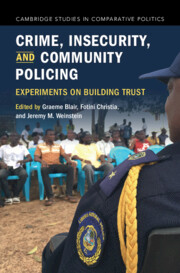Book contents
- Frontmatter
- Contents
- Contributors
- Acknowledgments
- Abbreviations
- Part I Crime, Insecurity, and Policing
- Part II The Effects of Community Policing
- 6 Meta-analysis of the Effects of Community Policing
- 7 Can Trust Be Built through Citizen Monitoring of Police Activity? Evidence from Santa Catarina, Brazil
- 8 Do Police–Community MeetingsWork? Experimental Evidence from Medellín, Colombia
- 9 Community Policing, Vigilantism, and the Rule of Law: Evidence from Liberia
- 10 Community Policing and Citizen Trust in Pakistan
- 11 Community Policing in the Philippines: Communication, Trust, and Service Provision
- 12 Restoring Police-Community Relations in Uganda
- Part III Reflecting on Community Policing
- References
- Index
- Series page
10 - Community Policing and Citizen Trust in Pakistan
from Part II - The Effects of Community Policing
Published online by Cambridge University Press: 09 December 2024
- Frontmatter
- Contents
- Contributors
- Acknowledgments
- Abbreviations
- Part I Crime, Insecurity, and Policing
- Part II The Effects of Community Policing
- 6 Meta-analysis of the Effects of Community Policing
- 7 Can Trust Be Built through Citizen Monitoring of Police Activity? Evidence from Santa Catarina, Brazil
- 8 Do Police–Community MeetingsWork? Experimental Evidence from Medellín, Colombia
- 9 Community Policing, Vigilantism, and the Rule of Law: Evidence from Liberia
- 10 Community Policing and Citizen Trust in Pakistan
- 11 Community Policing in the Philippines: Communication, Trust, and Service Provision
- 12 Restoring Police-Community Relations in Uganda
- Part III Reflecting on Community Policing
- References
- Index
- Series page
Summary
What is the effect of community policing in settings where trust in the police is low and local legal institutions make witness cooperation unusually critical for certain kinds of offenses? We study the effect of a citizen-centric problem-oriented policing (CPOP) intervention introduced in March 2019 in Punjab’s Sheikhupura Region, a mixed urban-rural region of 4.9M people. Treatment roll-out in Pakistan was significantly hampered by frequent transfers of the regional and district police officers, reflecting the challenges of implementing institutional reforms in settings where the police face frequent personnel changes. Despite these challenges, the intervention, which included regular town hall meetings at which citizens could share their concerns, led to significant increases in overall perceptions about the police and in citizen beliefs that police have good intentions with respect to addressing crime. Despite the favorable institutional environment for increased trust to lead to crime reduction, we find no evidence of downstream impacts of the program on self-reported crime victimization or crime reported to the police. Observational evidence from follow-up visits suggests that this was because of resource and institutional challenges that limited community police officers’ agency and prevented them from responding to community concerns.
- Type
- Chapter
- Information
- Crime, Insecurity, and Community PolicingExperiments on Building Trust, pp. 307 - 399Publisher: Cambridge University PressPrint publication year: 2024

